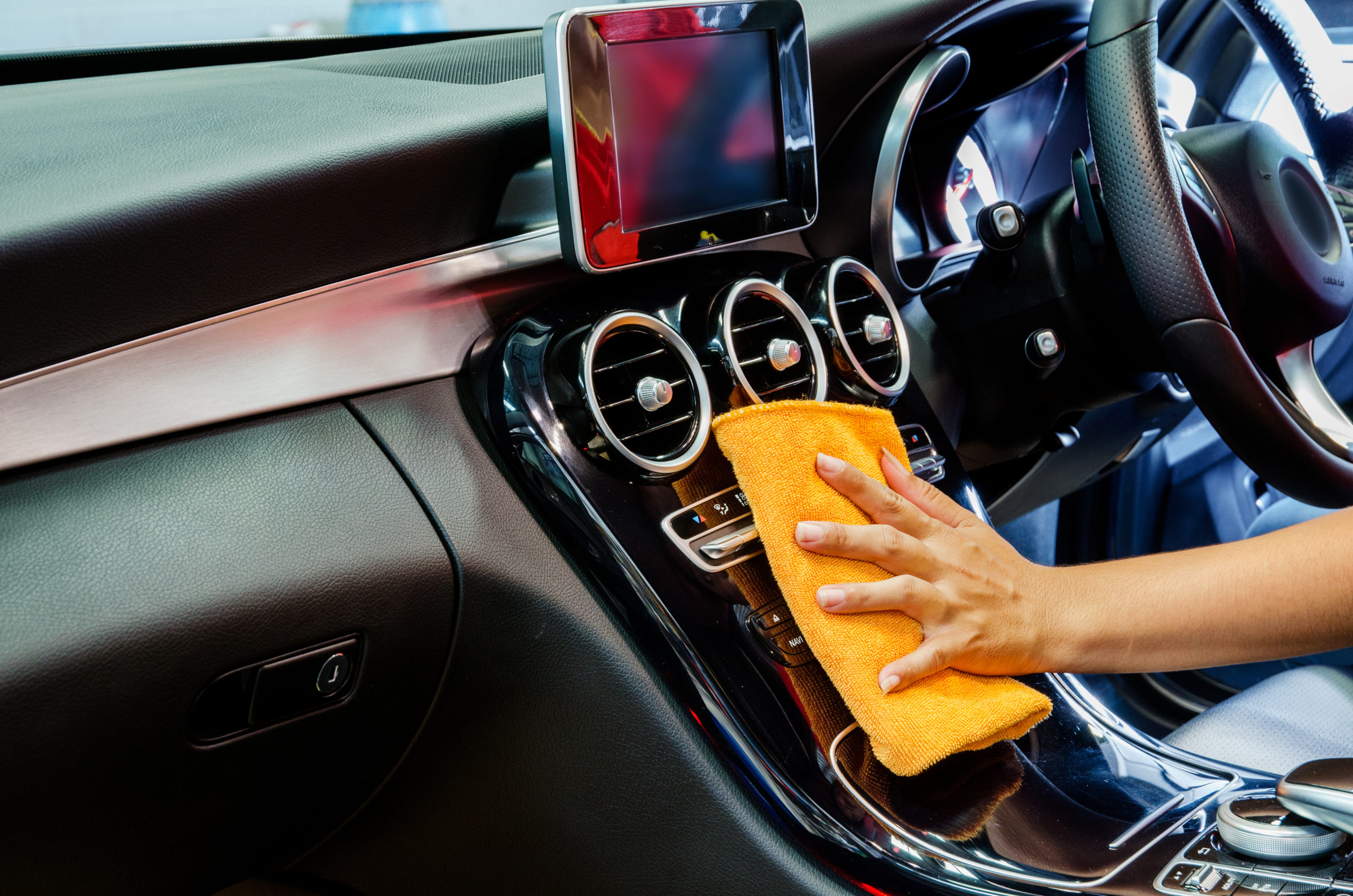Car interiors are a potential vector for coronavirus transmission. That’s one of the reasons why Uber, taxis, and other rideshare services are so strict with their COVID-19 policies. The coronavirus can survive for many hours on various surfaces in your car, and a simple wipe-down might not kill all of it, so you’ll need to carefully disinfect your car if you want to stay as safe as possible.
With that said, some chemicals and methods that are used to clean surfaces may damage your car interiors. It’s important to know the best ways of disinfecting your car without harming your seats, dash, and other car surfaces. This is especially important if you’re buying a used car, or driving a rideshare car.
If you’re in the market for a car during COVID-19, consider the Carpages Buy From Home program and look for the Buy From Home badge when shopping on Carpages.ca.
What Are The Best Chemicals And Products For Disinfecting Car Interiors?
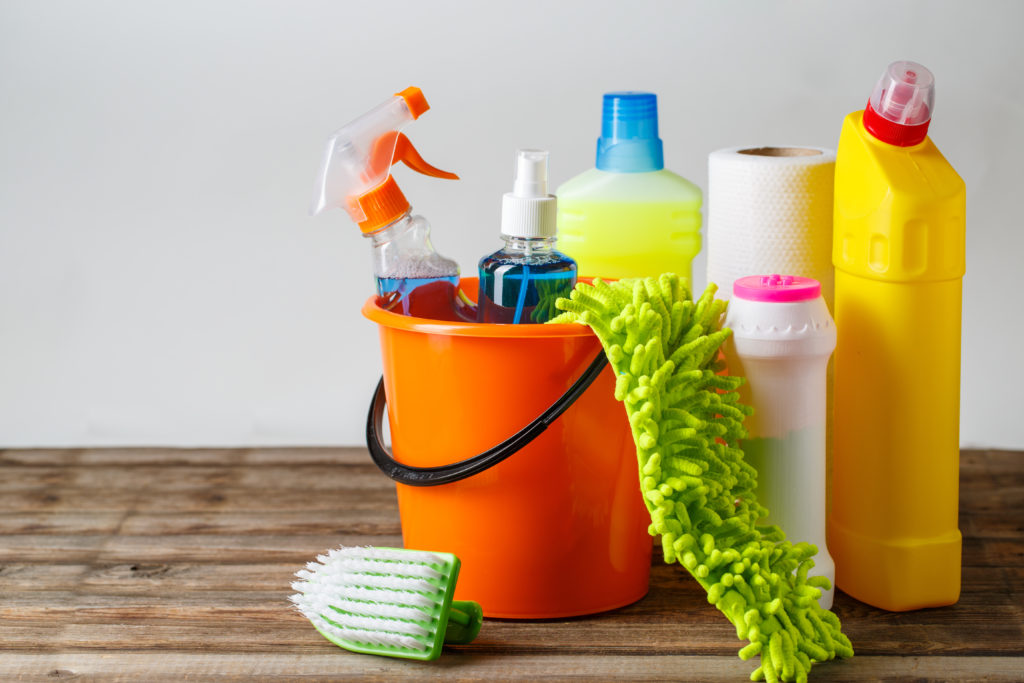
There are several chemicals that are used for disinfecting surfaces, which are effective against COVID-19. These are household cleaners that you may already have, or can easily be found on store shelves.
Soap
Soap has been one of the most powerful frontline tools in the fight against the coronavirus, and we’re reminded of its effectiveness every day when we wash our hands. After 20 seconds of CDC-approved sanitizing, we can be almost completely sure that any trace of the coronavirus is gone from our hands.
The reason that soap works so effectively on the virus is the same reason that soap can wash oils away. The coronavirus has an outer shell composed of a lipid bilayer, which is similar to the fat and oils found in food. And just like how washing your hands with soap can quickly remove butter or fat, soap can tear away this outer lipid shell, which deactivates the virus.
Combining the soap with warm water results in a lot of suds and bubbles. This prevents the virus from sticking to surfaces and improving the disinfecting capacity of soap. Using friction and vigorously rubbing the soap-water solution into the surface works even better.
This efficacy works on car interiors as well. Soap doesn’t harm dashboards, windows, fabric or leather car seats. Better yet, it will effectively destroy traces of the coronavirus on your car surfaces. Just don’t scrub your car seats too hard, or you risk ruining them through friction.
Alcohol
Alcohol is another effective weapon against coronavirus infection. A solution of isopropyl alcohol with a concentration between 60 and 90% will kill the coronavirus within seconds, denaturing the proteins that make up the virus molecules.
It’s important that only alcohol within this concentration range is used for disinfection. Too low a concentration won’t be strong enough, and too high a concentration (91% and above) may actually create a coagulated barrier that protects the virus from further destruction, requiring a much longer disinfection time.
Alcohol is often used by car interior part makers to clean their products, and it can be used to safely clean most surfaces without damaging them. However, if you have leather car seats, you should avoid alcohol, as frequent alcohol cleaning may be hurting your seats’ finish.
Disinfectant Sprays
Disinfectant sprays like Lysol and Clorox are very effective in defeating coronavirus contamination on almost any surface. Their claims of affecting up to 99.9% of viruses and bacteria are fairly accurate, especially when sprayed onto a cloth surface and left to dry. They’re safe to use on car interior surfaces, but you should ensure that you don’t miss a spot! These disinfectants are only effective on the exact spots where they’re applied.
The same applies for disinfectant wipes. They’re made with similar chemicals as the sprays, and have similar virus-killing capabilities but you should wipe down every square inch of dashboard and seat if you want to be effective.
What Disinfectants Should You Avoid For Car Interiors?
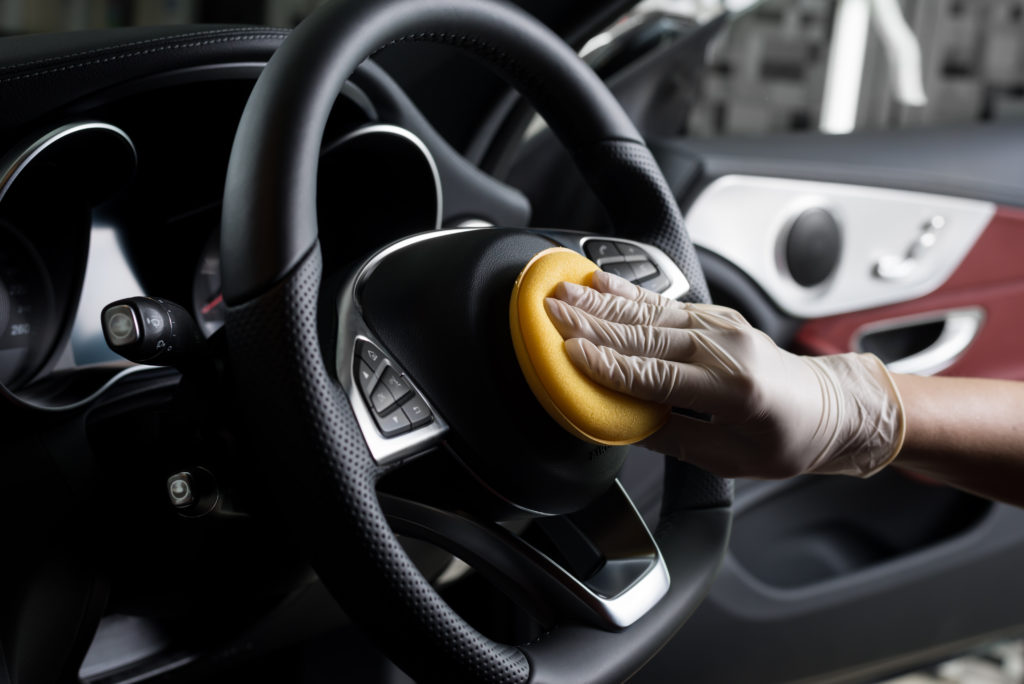
Not all disinfectants are appropriate for vehicles. Some stronger chemicals can damage your interiors, and should be avoided when cleaning your car.
Bleach
Bleach is a powerful disinfectant that can wipe out almost any contamination.
However, it is not safe to use with your car interiors. It’s likely to damage any kind of fabric or leather, and will corrode a lot of plastic, metal, and vinyl surfaces. And what’s more, chlorine-based bleach, the kind you normally find in households, may release chlorine gas during use, which could further corrode stainless steel and other metal that you didn’t even touch.
Hydrogen Peroxide
Another household chemical, hydrogen peroxide can be used to disinfect surfaces if left to settle for 8-15 minutes. However, it has a similar corrosive and discoloring effect that bleach does, so you should either avoid it for car surfaces or use it highly diluted.
Ammonia-based Cleansers
Ammonia-based cleansers are effective against COVID-19, but they should be avoided when cleaning your car’s center console if it has a touchscreen. Touchscreens have a coating that reduces glare and prevents fingerprints from staying on, and this coating may be degraded if you apply ammonia to it.
Can You Make Your Own Disinfectant Fluid?
Making a car-friendly disinfectant is fairly simple. All you really need for this is 99% isopropyl alcohol and water. Simply create a mixture using ⅔ cup 99% isopropyl alcohol and ⅓ cup water. This will dilute the alcohol into the appropriate concentration to neutralize the virus.
A good way to apply this disinfectant to your car is in the form of reusable disinfectant wipes. You can easily make these by repurposing an old cotton t-shirt (or any cotton fabric). Cut up your cloth into appropriately sized squares and then soak them in your disinfectant solution. Once done, store your used wipes in a sealed container. These can be reused after being washed using your washing machine’s hot water setting.
How Do You Disinfect Your Car Properly?
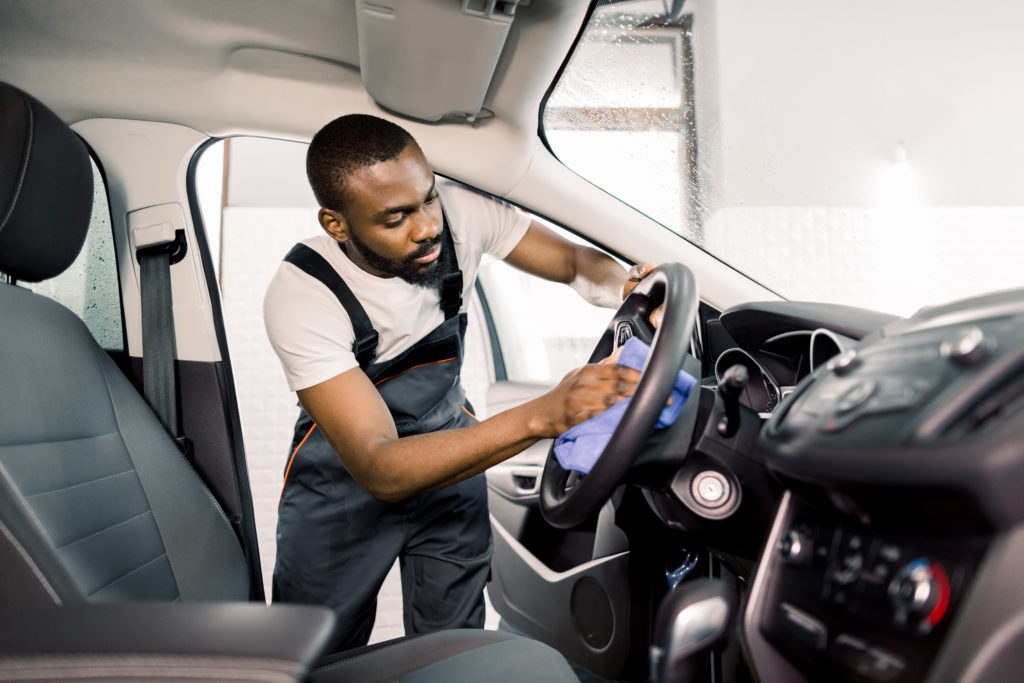
The primary disease transmission vector of COVID-19 is through the tiny droplets that are expelled whenever an infected person sneezes or coughs – these droplets can cause an infection when they touch a healthy person’s eyes, nose, mouth, and other mucous membranes. These only reach a range of about 1.8 meters.
However, a secondary cause of infection is when a person touches a surface that is contaminated with these droplets, and then touches their face. There’s evidence to suggest that the coronavirus can stick around and remain infectious for several hours on many surfaces.
The goal of disinfecting your car is to neutralize any traces of contamination that may have landed on your interiors.
Remove All Items From Your Vehicle
Before you begin cleansing, take out anything that gets in the way of cleaning. Check your seats, glove compartment, any shelves in your dash, and under your seats for any scattered trash.
Vacuum All Surfaces
After emptying your car, do a thorough vacuuming run on all surfaces. Dirt can make it harder for your disinfectants to do their job. You should also vacuum your carpets.
If you don’t have access to a vacuum, you can start by spraying all surfaces with a disinfectant spray, then letting it dry for about three minutes.
Focus On The Things You Touch The Most
The surfaces that are most susceptible to contamination are the ones that you touch the most. That would be the steering wheel, your shift knob, the buttons on your dash, your center console touchscreen and buttons, sun visor, and cup holders.
The best way to clean these is to use disinfectant wipes, or a soft cloth and your chosen disinfectant cleanser. For touchscreens, you should avoid ammonia-based cleansing fluids, as they might degrade the screen coatings. You should also use a microfiber cloth or else you risk scratching the screen.
In fact, it would be ideal if you use microfiber for all your dashboard surfaces. Microfiber materials prevent dirt and debris from sticking to them, whereas paper towels and napkins might trap little pieces of dirt in their fibers, which may then scratch plastic and vinyl surfaces when you wipe them down.
Avoid Using Too Much Water
Water is an essential part of cleaning with soap, but having too much water may cause problems with fabric seat covers. If you end up soaking the seat cover all the way down to the actual seat cushioning, you could create a breeding ground for mold and mildew, which can cause a bad smell and potential damage to the seats. Use just enough to make the seat cover damp when you wipe.
Get A Professional To Clean Your HVAC System
The SARS-CoV-2 coronavirus is not yet confirmed to be airborne, but it’s better to be safe than sorry. Your HVAC system is responsible for circulating air in your car, and you should clean it regularly to avoid possible contamination.
Doing a thorough cleanse of the system is complicated and may require the services of a professional. But if you can’t get a professional cleaner’s services, you can take out the cabin filter in your glove compartment and clean it.
You need to know what type of filter you have if you want to clean it safely. Paper filters are not reusable and should be replaced rather than cleaned. For cloth and carbon filters, use a low-pressure stream of water, like a hose turned down a little, to wash away the dirt, then soak them in a container of soapy water for about 10 minutes. After drying them completely, reinstall them.
Worst Case? Leave It In The Sun
The Sun’s UV rays have remarkable disinfectant powers. Even if you have windows that are UV-tinted, some of them will still pass through and slowly kill the coronavirus on exposed surfaces. If you can’t clean your car for whatever reason, leave it in the Sun for 4-5 days. That’ll give enough exposure to the Sun to sanitize your car, as well as take enough time to allow the virus to die off naturally.
How Do You Disinfect Leather Car Seats Without Buying A Special Cleaner?
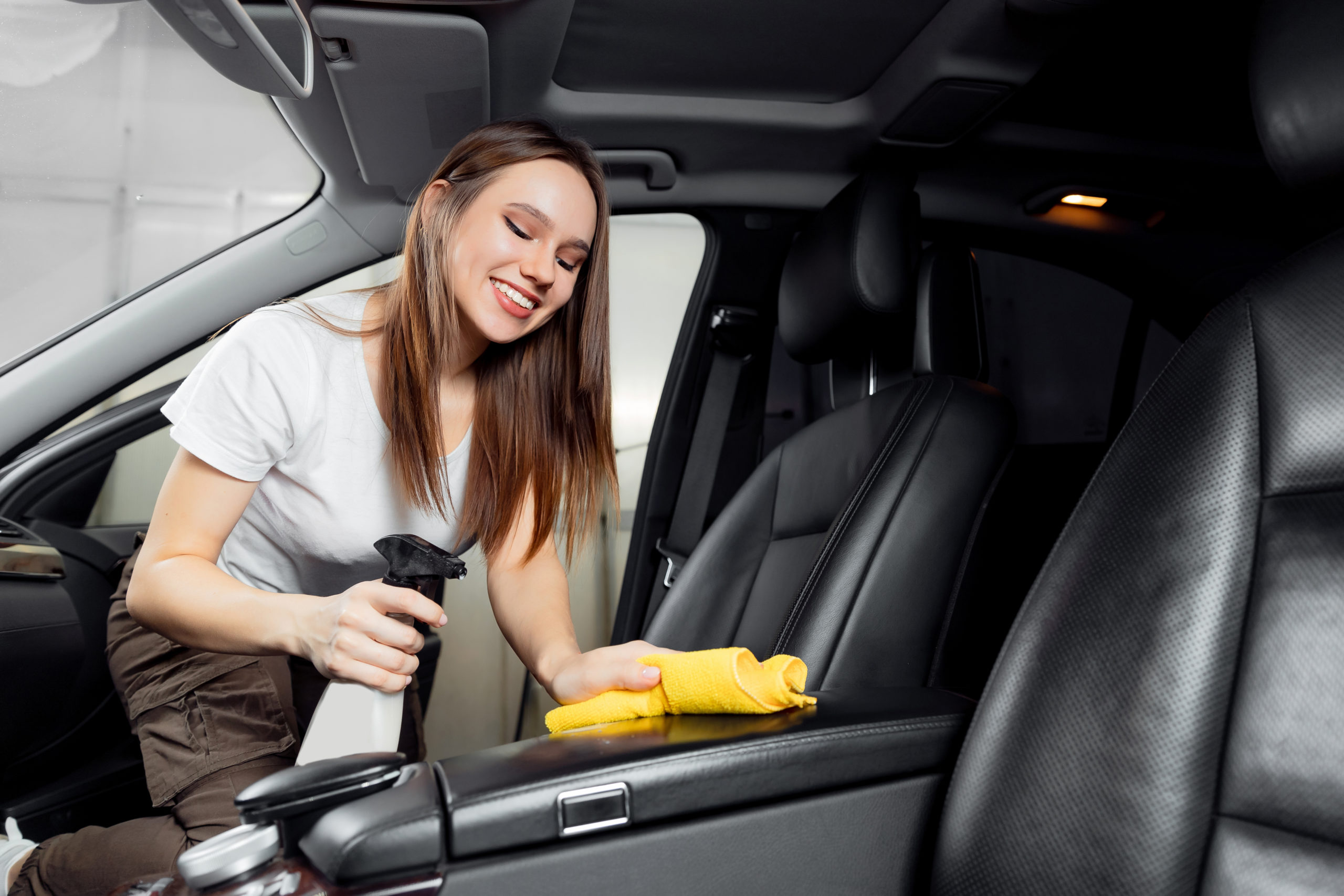
Because leather is so sensitive to certain chemicals, cleaning leather car seats is a delicate job. You can easily damage your leather seats when using common cleaning chemicals like bleach or hydrogen peroxide, which is why there are special leather cleaners available on the market.
But what do you do if you don’t have access to any retailers that provide leather cleaners? Your best home alternative would be to mix your own gentle cleaning liquid specifically for leather car seats. To do this, mix 5 parts warm water with 1 part liquid dishwashing soap. Dampen a cloth with the solution and wipe down your leather car seats. Make sure not to oversaturate your seats with the solution as this can easily seep through the leather and into the cushions. If possible, clean your seats twice before drying with a towel.
It is very important to remember not to use alcohol when cleaning your leather seats. This will dry out the leather and damage your seats. It can also affect the dye used to color the leather, which will lead to discoloration further down the road.
Just remember that once you have access to a shop that sells car cleaning materials, you might want to buy some leather conditioner. This will help restore the oils and texture of your possibly damaged car seats.
How Should You Clean The Inside Of Car Windows?
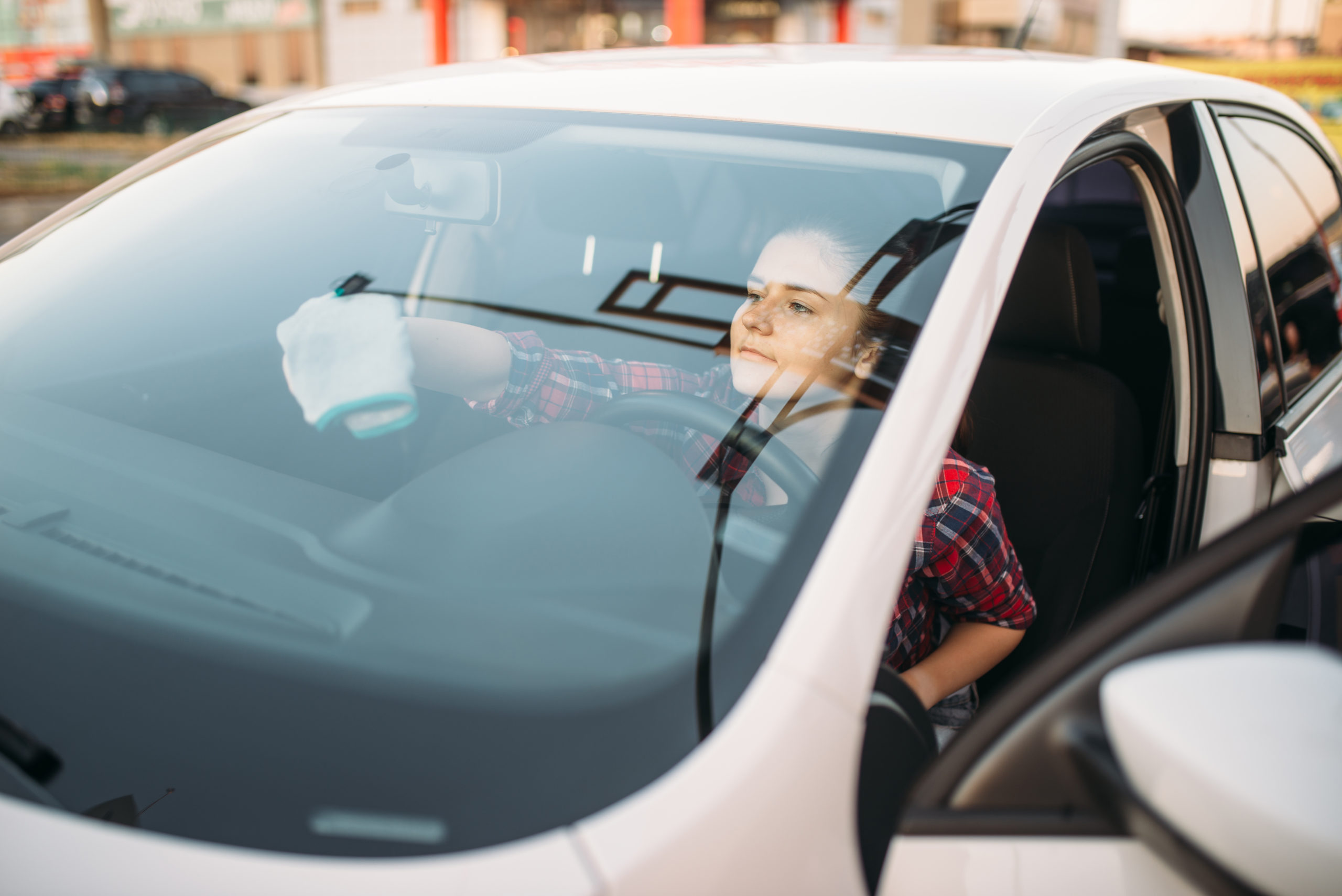
The inside of your car windows might not be the first thing on your mind when disinfecting your car. That makes sense, especially if you’re the only one who uses it. However, the virus can still persist on surfaces for up to 3 days in favorable conditions. You’re going to want to be safe and make sure that every surface of your car is disinfected. Pay extra close attention to your windows if you have a lot of other passengers.
Thankfully, glass car windows are pretty durable. This leaves you with lots of options on how to properly disinfect them.
- Soap and water: Good old fashioned soap and water can do the trick when cleaning the inside of your car windows. Simply spray them down with whatever soap-based cleaner you’re using, scrub lightly, and then rinse with water.
- Alcohol: Any alcohol within the appropriate concentration range of 60-90% should be safe to use on the glass surface. This also has the added benefit of being safe to use on the rubber seals that hold the window in place.
- Disinfectant sprays: Your run-of-the-mill disinfectant sprays like Lysol can be used on the inside of your car windows. Just make sure that you spray every surface, including the corners and seals.
When Should You Disinfect Your Car?
You don’t need to clean your car every day, or even every week. However, you do need to be more watchful of the passengers you take in. If someone who recently rode in your car shows symptoms of COVID-19, you should immediately disinfect your car to avoid further infection.
Even if it’s just you who’s in your car, you should wash your hands thoroughly every single time before you enter your car. This will prevent contamination of your car’s interiors, and it’s a great habit too to help keep your car clean in general. If you want to be extra safe, consider wearing gloves when driving.
Clean Your Car Safely!
Cleaning your car is a long and involved process, but it’s an essential part of auto care especially in the age of the COVID-19 pandemic. Cleaning your car with these safe and effective methods will ensure that you’re preventing the spread of disease and helping maintain your car, without affecting the quality of your interior surfaces!
